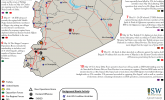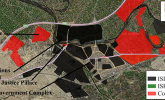Control of Terrain in Syria: May 20, 2015
May 20, 2015 - Institute for the Study of War
ISIS seized the regime-held town of al-Sukna west of Deir ez-Zour City on May 14 and then seized the regime stronghold of Palmyra on May 20 after regime forces reportedly executed a full withdrawal from the city, prison, and military airbase.










